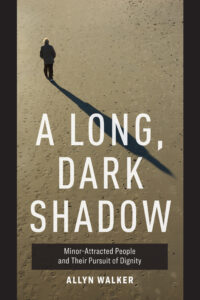
A Long, Dark Shadow: Minor-Attracted People and Their Pursuit of Dignity
by Allyn Walker
University of California Press
236 pp., $85.00
Let him who would understand the moral decay in academia reckon the existence of a book such as this one, published at one of the country’s most prestigious university presses.
The book’s basic claims concerning its topic, pedophilia, can be neatly summarized. Children are endangered not by adults who are sexually attracted to them but by public hatred of pedophilia, which causes pedophiles to offend. If there were greater acceptance of pedophilia, pedophiles would better control their desires, and fewer children would be assaulted. We should therefore normalize the identities and desires of pedophiles.
Allyn Walker realizes one cannot just come out and make those claims on page one. Much meandering and obfuscation provide the camouflage that makes it harder for casual readers to see what is right before their eyes. Early on, Walker masks the book’s moral message by rejecting the term “pedophile” and suggesting a replacement: “Minor-Attracted Persons,” or MAPs.
This is a time-tested method in the normalization of deviance: invent a new term for the condition that occludes any moral aberration associated with it. Then assert repeatedly that this is just one more natural identity into which we infinitely complex humans might be thrust by forces beyond our control.
One of Walker’s interviewees suggests that since “queer,” which previously alluded to abnormality, has been reappropriated to mean something wholly positive, perhaps “pedophile” might be similarly recuperated. Walker uses the language of “being out” to describe those who have revealed their pedophilia to others, further reducing the distance between pedophilia and more mainstream unconventional sexual identities.
Walker claims that the book’s subjects cannot be understood to be suffering from pathology, according to the American Psychiatric Association’s Diagnostic and Statistical Manual (DSM). But Pedophiliac Disorder is described there as having two components: desire for sexual contact with children and either acting on the desire or feeling distress at one’s condition. Even if one accepts the book’s claim that those interviewed here have never offended, many clearly express distress over their situation. By the terms of the DSM, then, they have the disorder, despite Walker’s claim to the contrary.
And just what is the evidence that the pedophiles Walker interviewed have never offended? Only that they told the author so. But most child sexual assault—perhaps 90 percent to 95 percent—is unreported. Criminals are typically interested in concealing their offenses, especially when their crimes bring significant punishment. Walker admits in an appendix that the subjects’ claims about not offending were unverified and notes that some of the interviewees were drawn from an online group that officially “decline[d] to take a moral stance on whether pedophilia is wrong.”
Half of those interviewed by Walker self-identify as pedophiles and were resistant to being renamed as MAPs. The range of their sexual attraction extended all the way down to one-year-old infants. Many spoke of feeling “emotionally stunted” and suffering from “Peter Pan syndrome.” Walker struggles mightily to positively skew these self-reports, and one easily imagines more disturbing data being omitted because it could not be fitted to the interpretive framework.
The descriptions interviewees gave of their condition and their desires starkly illustrate their pathology. One said he “just wants to fall in love”—with a child between the ages of eight and twelve! They want their desires “rebranded,” but Walker assures us they know that acting out those desires would be inevitably destructive. How can what they feel be love if acting on it will harm its object? Can desires exist that are morally good when unfulfilled but morally bad when put into practice? The book does not address these questions.
Much evidence belies Walker’s claims that the book’s subjects are avidly committed to never offending. Some of them believe age-of-consent laws are a form of ageism, a denial of agency to youth. Others expressed the belief that consensual relationships are possible, even if rare. One interviewee expressed the belief that sexual contact between adults and children should be legal “if the contact were initiated by a child.” They used the term “pro-choice” to describe those in their ranks who believe children morally capable of consenting to sex with adults.
Walker claims that avoiding harm to the child is the most important reason for these individuals not to offend. Yet in their own language, the fear of punishment loomed larger. “I’m damn straight afraid of the law,” said one. “I’m scared to death I’ll go to jail forever and rot in prison,” admitted another.
The book describes the use of child pornography in astoundingly blasé terms. Walker claims that there is “safe” child porn, which uses adult actors who look younger. Pedophiles will seek out child porn whether we like it or not, we are told, and their use of it will reduce their desire to offend. One man claimed that watching “the really hard stuff” made him more adamant not to offend because he identified with the child as a victim of abuse. Walker reports this statement without any criticism, despite the fact that research shows that the use of pornography is positively correlated with mental health pathologies, risky sexual behavior, and sexual violence.
Walker also presents as victims of oppressive discrimination those pedophiles who are removed from positions in which they have unsupervised access to children. Some of the book’s subjects bizarrely claimed that being around kids helps them avoid offending because otherwise, they would fantasize more. One subject described having been in a teacher training program until his pedophilia was discovered by a therapist, at which point he was, in Walker’s language, “unfortunately” thrown out. He informed his parents of the reason for his dismissal from the program. The parents embraced his identity and suggested he stop seeing the therapist. Walker applauds this and, indeed, throughout the book cheers the families of pedophiles who avoided making moral judgments and who rejected medical treatment for their family member.
Walker denounces mental-health treatment for pedophiles, claiming that health-care providers are insufficiently educated about Minor-Attracted Persons. These health-care providers also may be divided in their commitments between the patient and the children to whom the patient represents a threat. This divided focus is for Walker an intolerable failure to fully endorse pedophiliac identity. Many in the book share Walker’s sense that such providers cannot help them, yet more than half of them are still receiving mental-health treatment. Walker also admits that more than a quarter of the book’s subjects are drug- or alcohol-addicted. It is a singular population we are dealing with here, to say the least.
It is telling that the scandal of this book publicly broke when Walker did an online interview with the Prostasia Foundation, a group claiming to be concerned about child sex abuse. A look at their program’s principles reveals something else. Here are goals for which they advocate: encryption of online communications (to avoid law enforcement?); protection of sexting; freedom of online access to pornography; legal protection for “sex workers;” and kink awareness (i.e., sympathy for those displaying sexual perversions).
Walker’s employer, Old Dominion University, terminated Walker’s position in May. The university’s statement made clear that it was not making a moral pronouncement on Walker’s effort to normalize pedophilia but that it intended to protect the author from alleged threats. Walker also issued a statement that said, “I want to be clear: child sexual abuse is an inexcusable crime.”
Conservatives claimed victory for having prompted Walker’s dismissal. But it is at best an extremely limited victory. Days before this review was published, John Hopkins University announced that Walker had landed a job at its Moore Center for the Prevention of Child Sexual Abuse.
There are many more Allyn Walkers at other institutions who have gathered from this case valuable intelligence for their ongoing efforts at the demolition of American moral culture. A Long, Dark Shadow was slightly too much for the present moment. Slightly. Those other Walkers will now slow down just a bit and they will be more guarded online. But they will continue to push toward their goal of bringing pedophiles into the universe of moral acceptability.
The leftist philosopher Martha Nussbaum has argued that disgust is an entirely harmful emotional reaction. This is a blinkered view. In many situations, disgust is a healthy, properly calibrated response to harmful phenomena. Rotting flesh disgusts us, and this is a good thing because the virulent bacteria that fester there can also infect us. Serious moral depravity—the desire to abuse children, for example—is repellent to healthy people because we recognize it as destructive to individuals and social groups. A Long, Dark Shadow is a morally repulsive book. Readers should come away from it with greater awareness of the threat posed by those who would normalize pedophilia.
Top image: The pedophile José Ángel S. S. on trial in January in Madrid, Spain, for sexually abusing nearly 100 children. The 31-year-old lawyer was sentenced to 700 years in prison (though he will only serve a maximum of 30 years).
(Alejandro Martínez Vélez / Europa Press via the Associated Press)

Leave a Reply